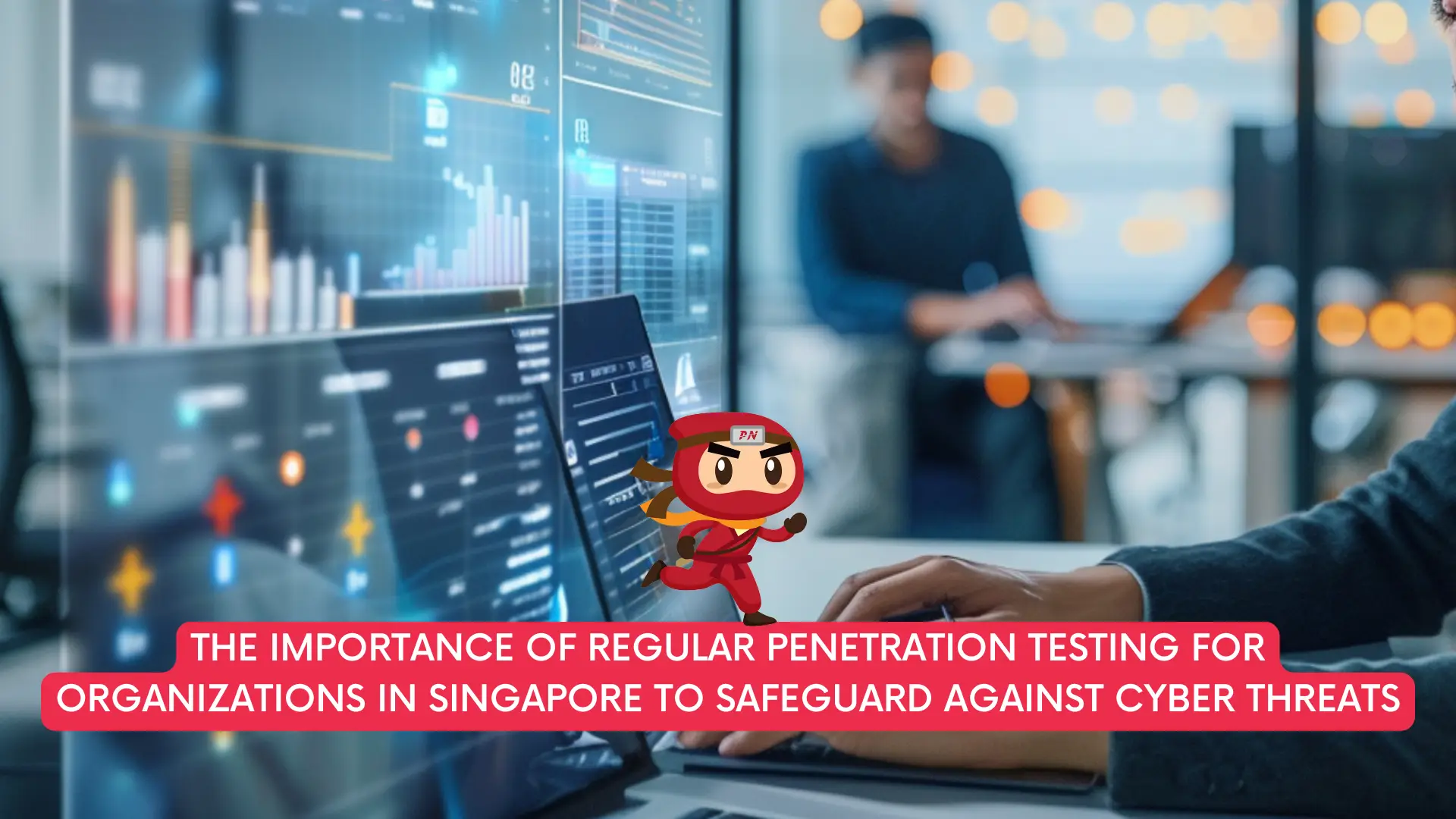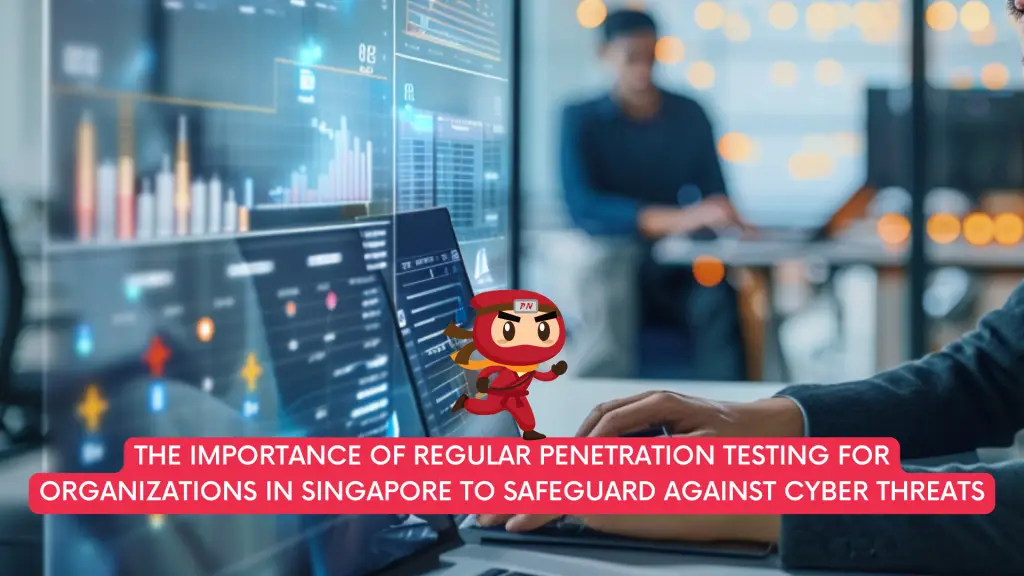KEEP IN TOUCH
Subscribe to our mailing list to get free tips on Data Protection and Cybersecurity updates weekly!







In today’s digital landscape, organizations face an increasing number of cyber threats, from hacking attempts to data breaches and ransomware attacks. These threats can compromise sensitive information, harm an organization’s reputation, and lead to severe financial penalties. One effective way for organizations to mitigate such risks is through regular penetration testing. Penetration testing—often referred to as ethical hacking—is a proactive cybersecurity measure that simulates real-world cyberattacks to identify vulnerabilities in an organization’s systems, networks, and applications. For organizations in Singapore, regular penetration testing is not just a best practice, but a necessity. This article delves into why regular penetration testing is critical for organizations in Singapore, the benefits it provides, and the actions organizations should take to protect themselves from potential threats.
Penetration testing involves a simulated attack on an organization’s IT infrastructure to assess its security. Ethical hackers, or penetration testers, use the same techniques that cybercriminals employ, such as exploiting vulnerabilities in software, systems, or network configurations, to test the organization’s defenses. This process helps to uncover weaknesses that could be exploited by attackers and provides the organization with an opportunity to fix them before malicious hackers can take advantage.
Penetration testing is different from vulnerability scanning in that it goes beyond identifying known vulnerabilities. It attempts to exploit vulnerabilities to determine their severity and the potential impact on the organization. This real-world simulation provides a clearer picture of an organization’s security posture and its ability to defend against sophisticated attacks.
Singapore has firmly established itself as a regional leader in digital transformation, with businesses increasingly relying on digital technologies to operate. However, this digitalization also comes with inherent risks. According to the Singapore Cybersecurity Strategy 2021, the country faces a growing number of cyber threats, ranging from phishing and malware attacks to advanced persistent threats (APTs). The Singapore government has recognized these risks and implemented several regulations to protect organizations and individuals from cyber threats, including the Cybersecurity Act and the Personal Data Protection Act (PDPA).
The PDPA, in particular, places significant responsibility on organizations to protect the personal data they collect and process. A data breach caused by a vulnerability that could have been identified through penetration testing could result in severe legal and financial consequences for organizations. Failure to protect personal data can lead to hefty fines and damage to the organization’s reputation. Therefore, it is essential for organizations in Singapore to adopt a robust cybersecurity strategy that includes regular penetration testing.
The primary purpose of penetration testing is to identify vulnerabilities in systems, applications, and networks that could be exploited by malicious actors. Many organizations have a false sense of security, thinking that they are protected simply because they have firewalls, antivirus software, and other basic security measures in place. However, cybercriminals often employ sophisticated techniques to bypass these defenses, targeting weaknesses that may not be immediately apparent. Regular penetration testing helps organizations stay ahead of potential attackers by identifying hidden vulnerabilities that need to be patched or mitigated.
In Singapore, organizations are bound by regulations such as the PDPA and the Cybersecurity Act, which impose strict requirements on data protection and cybersecurity. These regulations require organizations to take reasonable steps to protect personal data and ensure that their IT systems are secure. Regular penetration testing is a proactive measure that can demonstrate an organization’s commitment to compliance. It helps organizations identify areas where their cybersecurity practices may be lacking and ensures that they are meeting the regulatory requirements set by the government.

Penetration testing also helps organizations improve their ability to detect and respond to cyber threats. By simulating real-world attacks, penetration testers assess the effectiveness of an organization’s security monitoring and incident response protocols. They can identify gaps in security operations, such as insufficient intrusion detection systems (IDS) or slow response times to detected threats. This enables organizations to refine their security processes, ensuring that they are better prepared to respond to actual cyberattacks.
Organizations in Singapore handle a vast amount of sensitive data, including customer information, financial records, and intellectual property. A breach of this data can lead to devastating consequences, such as legal actions, loss of customer trust, and financial penalties. Penetration testing helps organizations identify vulnerabilities that could lead to unauthorized access to sensitive data. By addressing these weaknesses, organizations can better protect their most valuable assets and prevent data breaches.
Cyberattacks are not only costly in terms of reputational damage but also in terms of direct financial losses. A successful attack can lead to operational downtime, theft of intellectual property, or financial fraud. Moreover, the aftermath of a data breach often involves significant costs related to legal fees, regulatory fines, and compensation for affected customers. By conducting regular penetration testing, organizations can identify vulnerabilities before attackers exploit them, reducing the likelihood of an expensive cyberattack.
Trust is essential in business, and customers are more likely to engage with companies that take cybersecurity seriously. Organizations that regularly test their security defenses and demonstrate their commitment to protecting personal data are seen as more trustworthy. Regular penetration testing not only helps prevent security incidents but also serves as a powerful marketing tool, showing customers and stakeholders that the organization prioritizes cybersecurity and is committed to safeguarding their information.
The consequences of neglecting regular penetration testing can be severe. Cybercriminals are constantly evolving their techniques, finding new ways to exploit vulnerabilities. If an organization fails to regularly test its security, it may miss out on identifying new or emerging vulnerabilities, leaving it open to attack. Moreover, without regular penetration testing, organizations may develop a false sense of security and delay addressing critical weaknesses.
In the event of a cyberattack or data breach, organizations that have not conducted regular penetration testing could face aggravated penalties, especially if they are found to have neglected reasonable measures to secure their systems. Additionally, the damage to the organization’s reputation and customer trust can be long-lasting, even after financial and legal issues are resolved.

To get the most out of penetration testing, organizations should adopt best practices that ensure the tests are thorough, timely, and actionable:
In conclusion, regular penetration testing is an essential cybersecurity measure for every organization in Singapore. With the growing number of cyber threats, the increasing sophistication of attackers, and the stringent legal and regulatory requirements, organizations must ensure their IT systems are secure. Penetration testing not only helps identify vulnerabilities but also ensures compliance, enhances threat detection, and prevents financial and reputational damage. By conducting regular penetration tests and addressing identified weaknesses promptly, organizations can protect themselves from potential attacks and demonstrate their commitment to cybersecurity.
Your appointed DPO can work with you on your PDPA compliance, ensuring that there will be policies in place to make sure that the handling of personal data is PDPA compliant.
A Data Protection Officer (DPO) oversees data protection responsibilities and ensures that organisations comply with the Personal Data Protection Act (PDPA). Furthermore, every Organisation’s DPO should be able to curb any instances of PDPA noncompliance as it is the officer responsible for maintaining the positive posture of an organisation’s cybersecurity.
DPOs complement organisations’ efforts to ensure that the organisation’s methods of collecting personal data comply with the PDPA. It also ensures that policies are set in place to make sure that there will be no instances of data breaches in the future.
Don’t wait any longer to ensure your organisation is PDPA compliant. Take our free 3-minute PDPA Compliance Self-audit checklist now, the same “secret weapon” used by our clients to keep them on track. Upon completion, we will send you the results so you can take the necessary action to protect your customers’ data. Complete the free assessment checklist today and take the first step towards protecting your customers’ personal data.